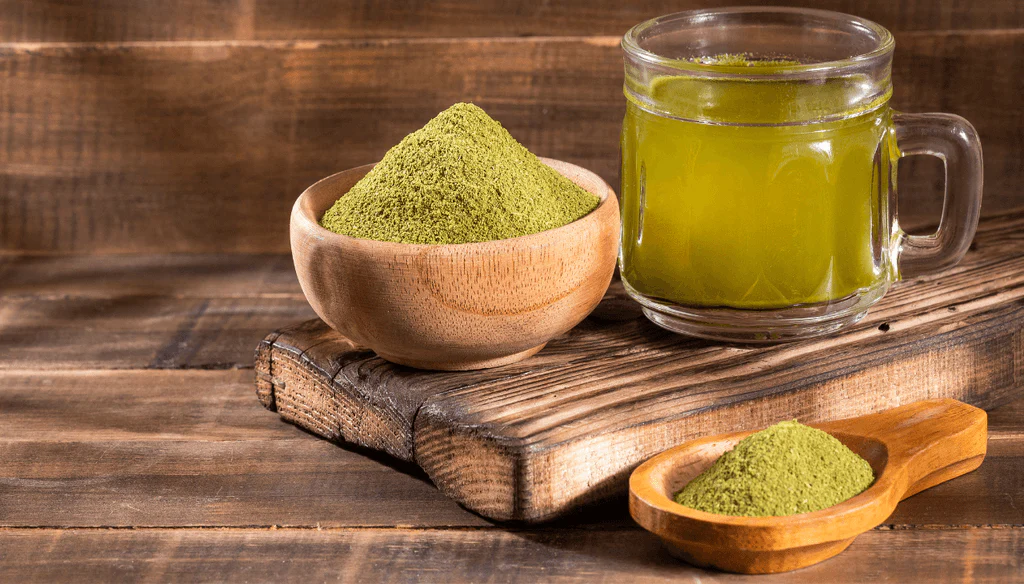Introduction to Moringa: A Nutritional Powerhouse
Moringa oleifera, often hailed as the “miracle tree,” stands out as a nutritional powerhouse, offering a myriad of health benefits. Originating from the foothills of the Himalayas, this versatile plant has gained global recognition for its exceptional nutritional content and medicinal properties.
Table of Contents
The Magic Behind Moringa’s Health Benefits
The “magic” behind moringa’s health benefits lies in its dense nutritional content and the presence of various bioactive compounds. Moringa oleifera, often hailed as a “miracle tree,” is packed with a wide range of vitamins, minerals, antioxidants, and other phytonutrients that contribute to its remarkable health-promoting properties. Here’s a closer look at the components that make moringa so beneficial for health:
1. Rich Nutritional Profile
- Vitamins and Minerals: Moringa leaves are rich in vitamins A, C, and E, which are crucial for maintaining healthy vision, skin, and immune function, as well as antioxidant defense. They also contain significant amounts of calcium for bone health, iron for blood oxygenation, and potassium for heart and muscle function.
- Proteins: Moringa leaves are a rare plant source of complete protein, containing all nine essential amino acids necessary for human health. This makes it particularly valuable in vegetarian and vegan diets.
2. Antioxidants
- Quercetin: This powerful antioxidant may help lower blood pressure and has anti-inflammatory effects.
- Chlorogenic Acid: Known for its ability to help moderate blood sugar levels after meals, it’s also found in high amounts in coffee.
- Beta-Carotene: An antioxidant that the body converts into vitamin A, essential for growth, immune function, and eye health.
- Vitamin E: Contributes to combating oxidative stress in the body, protecting cells from damage caused by free radicals.
3. Anti-inflammatory Compounds
Moringa contains isothiocyanates, which have been shown to possess strong anti-inflammatory properties. Chronic inflammation is linked to numerous health conditions, including heart disease, diabetes, and cancer, making moringa’s anti-inflammatory effects particularly beneficial.
4. Niaziminin
This compound, found in moringa, has been studied for its potential anti-cancer and anti-hypertensive effects, showcasing moringa’s diverse therapeutic potential.
5. Alkaloids
Moringa contains alkaloids like moringinine, which can act as a stimulant and affect blood pressure, further contributing to its health benefits.
6. Fiber
The high fiber content in moringa leaves helps in promoting a healthy digestive system, preventing constipation, and supporting a balanced microbiome.
7. Phytochemicals
Moringa is packed with a variety of phytochemicals that have antioxidant, antiviral, and antimicrobial properties, contributing to its ability to fight infections and boost the immune system.
Health Benefits Overview
- Nutrient Deficiency Prevention: Its rich array of vitamins and minerals can help combat nutrient deficiencies.
- Blood Sugar Regulation: Antioxidants and bioactive compounds in moringa may help in managing blood sugar levels, beneficial for preventing and managing diabetes.
- Cholesterol Management: Moringa can lower cholesterol levels, reducing the risk of heart disease.
- Anti-inflammatory and Antioxidant Support: Helps reduce inflammation and oxidative stress, lowering the risk of chronic diseases.
- Digestive Health: The fiber and isothiocyanates in moringa support digestive health and may help prevent conditions like constipation and gastrointestinal disorders.
The combination of these nutrients and compounds in moringa works synergistically to provide its wide range of health benefits. This synergy is what makes moringa a “superfood” and explains the growing interest in its use as a dietary supplement for health improvement and disease prevention. Despite its numerous benefits, it’s important to consume moringa as part of a balanced diet and consult healthcare professionals before using it for medicinal purposes, especially for those with existing health conditions or who are pregnant or breastfeeding.
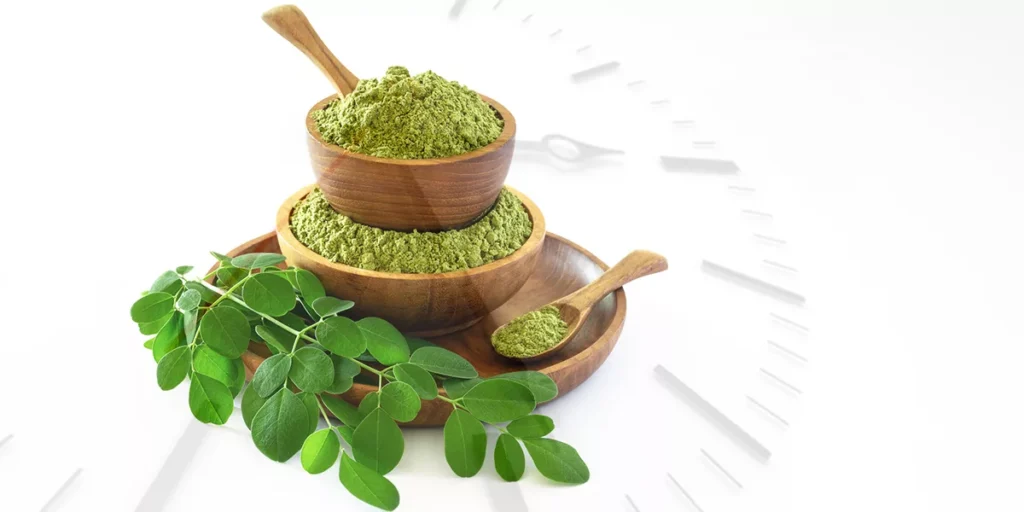
How to Incorporate Moringa into Your Diet
Incorporating moringa into your diet is an excellent way to boost your intake of essential nutrients, antioxidants, and plant-based proteins. Moringa powder, derived from the dried leaves of the Moringa oleifera tree, is the most common form available and can be easily added to a variety of foods and drinks. Here are some practical and tasty ways to include moringa in your daily routine:
1. Moringa Smoothies
Blend moringa powder into your morning smoothie for a nutrient-rich start to your day. The powder pairs well with fruits like bananas, mangoes, and berries, which help mask its earthy taste. Adding a tablespoon of moringa powder to your smoothie can significantly boost its nutritional value.
2. Teas and Beverages
Stir a teaspoon of moringa powder into hot water to make a simple moringa tea. For added flavor, you can include honey, lemon, or ginger. Moringa can also be mixed into other beverages, such as juices or milk, to create nutritious drinks.
3. Soups and Stews
Moringa powder can be easily incorporated into soups and stews. Add the powder towards the end of cooking to preserve its nutritional content. Start with a small amount and adjust to taste as it has a strong flavor that can become overpowering.
4. Baked Goods
Moringa powder can be added to bread, muffins, pancakes, and other baked goods. It not only increases the nutritional value of these items but also gives them a vibrant green color. Substitute a small portion of flour with moringa powder in your recipes.
5. Salad Dressings
Create a healthy salad dressing by mixing moringa powder with olive oil, vinegar, lemon juice, and your choice of herbs and spices. This is an effortless way to add moringa’s health benefits to raw vegetables.
6. Sprinkled Over Meals
Simply sprinkle moringa powder over your meals, such as rice, pasta, or vegetables, before serving. This method is quick and easy, allowing you to enrich your dishes with extra nutrients without changing your cooking routine.
7. Energy Bars and Balls
For a nutritious snack, incorporate moringa powder into homemade energy bars or balls. Combine it with oats, nuts, seeds, and a binder like honey or dates. These snacks are perfect for a quick energy boost during the day.
8. Yogurt and Breakfast Bowls
Mix moringa powder into yogurt or oatmeal to enrich your breakfast with vitamins, minerals, and proteins. You can also add it to granola or cereal bowls, along with fruits and nuts, for a nutritious morning meal.
9. Homemade Sauces and Pesto
Add moringa powder to homemade sauces, pesto, or dips. Its earthy flavor complements green herbs and garlic, making it a nutritious addition to pasta dishes and spreads.
10. In Cooking Grains
Stir moringa powder into cooked grains like rice, quinoa, or couscous. It’s an easy way to boost the nutritional content of your side dishes without significantly altering their flavor.
Tips for Incorporation
- Start with Small Amounts: Begin with a small quantity of moringa powder and gradually increase it to suit your taste and dietary needs.
- Quality Matters: Choose high-quality, organic moringa powder to ensure you’re getting the best nutritional benefits without contaminants.
- Heat Sensitivity: To preserve its nutrients, avoid cooking moringa powder at high temperatures for extended periods. Add it towards the end of the cooking process or sprinkle it on dishes just before serving.
Incorporating moringa into your diet is a simple and effective way to enhance your nutritional intake. Its versatility in various recipes makes it easy to enjoy the health benefits of this superfood every day.
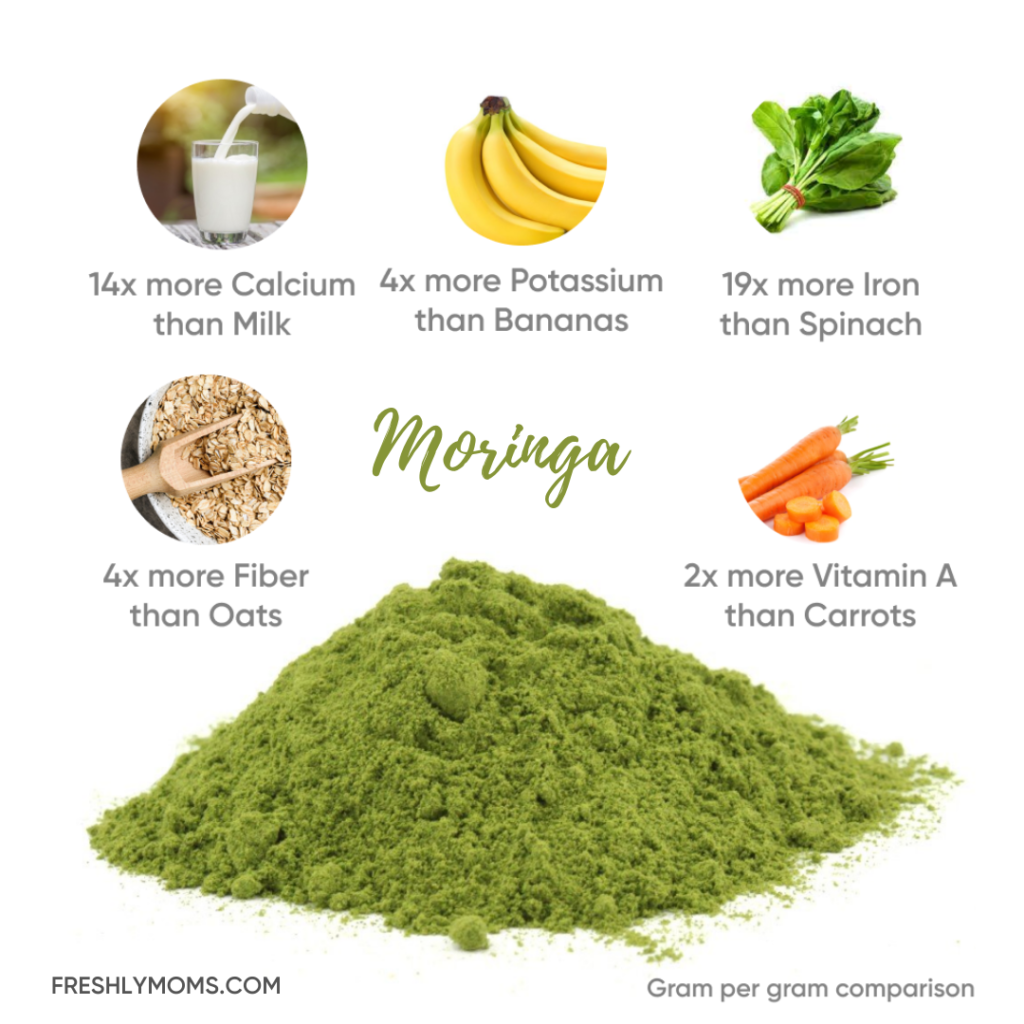
Moringa’s Role in Wellness and Immunity
Moringa oleifera, widely recognized for its nutritional richness and medicinal properties, plays a significant role in wellness and immunity. Its leaves, seeds, and even bark are used in various forms—powder, capsules, teas, and oils—each contributing to health and well-being in multiple ways. Here’s how moringa supports wellness and boosts the immune system:
Nutritional Powerhouse
Moringa is packed with vitamins, minerals, and amino acids essential for overall health. It contains high levels of vitamin C, vitamin A, calcium, potassium, and iron, all of which are crucial for maintaining a strong and responsive immune system. The presence of all nine essential amino acids makes it a rare plant-based source of complete protein, supporting body repair, growth, and development.
Antioxidant Rich
One of the key features of moringa is its high antioxidant content, including quercetin, chlorogenic acid, and beta-carotene. These antioxidants combat oxidative stress and free radicals, molecules that can cause inflammation and cell damage. By neutralizing these free radicals, moringa protects the body at the cellular level and supports immune function.
Anti-inflammatory Effects
Chronic inflammation can lead to various health issues, including autoimmune diseases, cardiovascular diseases, and diabetes. Moringa contains compounds like isothiocyanates, known for their anti-inflammatory properties, helping to reduce inflammation and support a healthy immune response.
Enhances Immune Function
Vitamin A and vitamin C, abundantly found in moringa, are critical for immune defense. Vitamin A is essential for maintaining the integrity of mucosal barriers (like the gut lining and respiratory tract), while vitamin C stimulates the production and function of white blood cells. Together, they help protect the body against pathogens and infections.
Antimicrobial and Antibacterial Properties
Moringa has been shown to possess antimicrobial and antibacterial properties, making it effective against some bacteria and fungi. This capability not only supports the immune system’s fight against infections but can also be beneficial in wound healing and preventing infection.
Supports Digestive Health
A healthy gut is fundamental to a strong immune system, as a significant portion of immune cells resides in the gut. The fiber in moringa supports digestive health, promoting a healthy gut microbiome. A balanced gut flora not only improves digestion but also enhances immune response and inflammation control.
Nutrient Absorption
Moringa’s high content of vitamins and minerals can improve nutrient absorption and metabolism, ensuring that the body efficiently utilizes the nutrients from food for energy, repair, and immune functions.
Stress Reduction
Moringa may have adaptogenic properties, substances that help the body manage stress. Chronic stress can weaken the immune system, making the body more susceptible to illness. By potentially reducing stress levels, moringa can indirectly support immune health.
Incorporating Moringa into Your Diet
To harness moringa’s wellness and immunity-boosting benefits, you can incorporate it into your diet in various forms. Adding moringa powder to smoothies, soups, and salads, or drinking moringa tea, are simple ways to enjoy its health benefits. However, it’s essential to start with small amounts to gauge your body’s response and consult with a healthcare provider, especially if you have any health conditions or are pregnant.
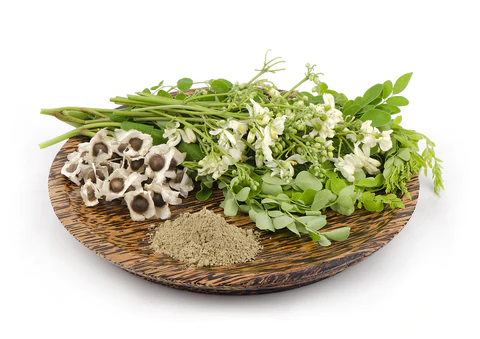
Sustainability and Global Impact of Moringa Cultivation
Moringa oleifera, often hailed as a “miracle tree,” is not only renowned for its nutritional and medicinal properties but also for its sustainability and positive impact on the global environment and communities. The cultivation of moringa contributes to several key areas of sustainability and global development, making it an important crop for the future.
Environmental Sustainability
Drought Resistance: Moringa trees require minimal water compared to other crops, making them ideal for cultivation in arid and semi-arid regions. This characteristic helps in conserving water resources and ensures survival in climates vulnerable to drought.
Soil Improvement: Moringa has a deep root system that helps in preventing soil erosion. Its leaves, when used as green manure, enrich the soil with nutrients, improving soil fertility and aiding in the rehabilitation of degraded lands.
Carbon Sequestration: Like other trees, moringa absorbs carbon dioxide from the atmosphere, contributing to the mitigation of climate change. Its rapid growth rate and biomass production make it an effective tool in carbon sequestration efforts.
Biodiversity: The cultivation of moringa can support biodiversity in agricultural systems. It serves as a habitat for a variety of insects and birds, promoting ecological balance and preserving biodiversity.
Economic Impact
Income Generation: Moringa cultivation offers a source of income for farmers, particularly in developing countries. The tree’s various parts—leaves, seeds, pods, and flowers—can be sold or processed into products like powders, oils, and supplements, providing multiple revenue streams.
Employment Opportunities: The growing global demand for moringa products has the potential to create jobs in farming, processing, and marketing, contributing to economic development in rural areas.
Low Input Costs: Moringa grows well in poor soils with little need for fertilizers, pesticides, or intensive labor, reducing the barriers to entry for small-scale farmers and allowing for more sustainable agricultural practices.
Health and Nutrition
Combating Malnutrition: Moringa is rich in vitamins, minerals, and protein, making it an excellent supplement to combat malnutrition in regions suffering from food insecurity. Its leaves can be easily incorporated into diets to improve nutritional status.
Food Security: The resilience and adaptability of the moringa tree to various environmental conditions make it a reliable source of food and nutrition, contributing to food security in vulnerable regions.
Water Purification
Moringa seeds contain a protein that can bind to impurities, allowing them to settle and clarifying the water. This natural purification method can provide a sustainable solution for clean drinking water in communities without access to safe water sources.
Global Health
The medicinal properties of moringa, including its anti-inflammatory, antibacterial, and antiviral effects, make it a valuable resource for natural healthcare, potentially reducing reliance on synthetic drugs and supporting global health initiatives.
Challenges and Considerations
While the benefits of moringa cultivation are significant, there are challenges to consider, such as the need for sustainable harvesting practices to ensure long-term viability and preventing overexploitation. Additionally, further research and development can help optimize cultivation techniques, expand its use in various industries, and maximize its environmental and economic benefits.
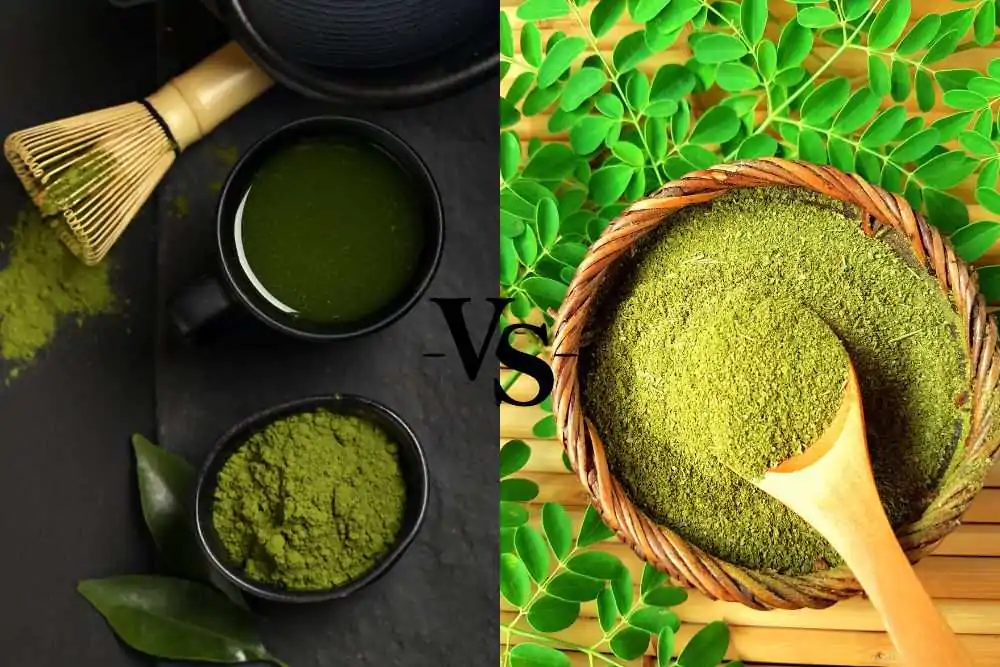
Source to Get Organic Moringa Leaf Powder Capsules
Conclusion: Embracing Moringa for a Healthier Lifestyle
Incorporating Moringa into your daily routine can significantly contribute to enhanced health and well-being. Its nutritional richness, coupled with its sustainable cultivation, makes it a valuable asset for both personal health and the planet.
FAQs on Moringa Magic
- Is Moringa safe for daily consumption?
- How does Moringa contribute to skin health?
- Can Moringa be used as a natural remedy for common ailments?
- Are there any side effects associated with Moringa consumption?
- What is the recommended daily dosage of Moringa for adults?
